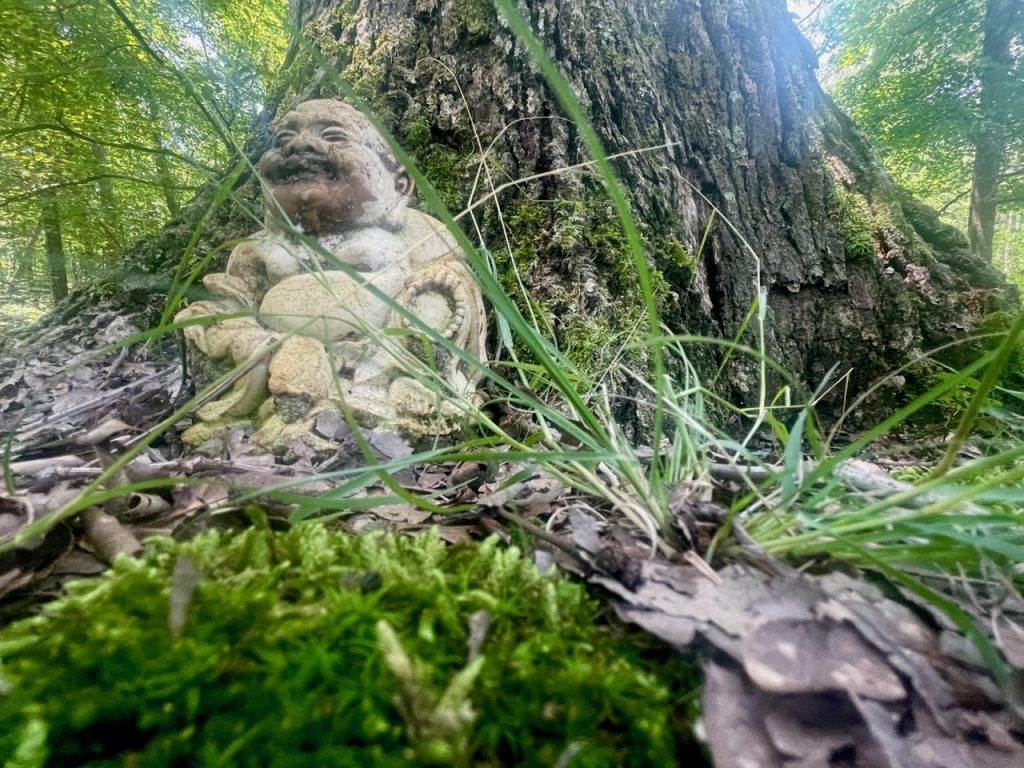
Practice of the ten, realization
of the fabric of perfection
The dependence on condition,
self-deluded perception,
inclination toward volition
Cessation of causation,
revelation self-liberation.

Ideas realized

Practice of the ten, realization
of the fabric of perfection
The dependence on condition,
self-deluded perception,
inclination toward volition
Cessation of causation,
revelation self-liberation.

Who none knows Where goes What realizes Who arises Who deceives whom By what deception When who and whom Conceptual perceptions Who realizes What arises Who goes Where none knows
Though lost to time, the ”Prince Christened” suttra is said to have been a teaching on mindfulness and impermanence. Of it only the following phrase has been preserved, “Permanent mind mindful impermanence.” The phrase itself was preserved as the title to a commentary on the suttra attributed to Gacchami, a babado mystic from before the War of Ascension. The commentaries have also been lost, but the teachings based on them were passed down for many generations and were preserved in “As recited by my Teacher and retold so as I would remember,” a short narrative by an anonymous student of the Saranagamana Yoga Academy.
Herein are my recollections and reflections of a teaching from my Master.
Once, while taking refuge at Mahabodi under shade of an Oak, I sat in adoration near my master. Realizing I was troubled he asked, “What afflicts you, son?”
“Master, I have studied the Suttras, Tantras and their many commentaries and I see the truth in them without direct realization. But I feel overwhelmed in my studies. With so much to retain and yet even more to attain. Teacher, with so much in mind, I find it difficult to be mindful.”
Here follows what was said on the “Prince Christened” suttra…
“What one fool can realize so too can another.”
So said my Teacher when he conveyed to me what was passed to him, regarding the teachings on the “Permanent mind mindful impermanence.”
“By solemn vow, from a base of refuge, and paying homage to my Teacher, I now convey what was then conveyed.”
“Homage to the great perfection.”
“Unwatched the mind flutters like a leaf in the wind. As an Oak needs its roots so too the mindful mind.”
“Thus mindful of breath, root the mind.”
“So rooted…”
“Be mindful of the difficulty in attaining this human existence, just that be mindful that.”
“Be mindful of the sublime brevity that is human existence, just that be mindful that.”
“Be mindful of cause and consequence universal, just that be mindful that.”
“Be mindful the many perils in cyclic existence, just that be mindful that.”
“Thus mindful awaken the compassionate mind.”
“And how does one train to be mindful and thus awaken the compassionate mind?”
“Train the mind thus, with resolve to accomplish the highest good. Thus mindful, accomplish the highest good.”
“Train the mind thus, with regard to inferiority of self. Thus mindful, appreciate others.”
“Train the mind thus, to watch for the arising of disturbing thoughts. Thus mindful, vanquish the arising of disturbing thoughts.”
“Train the mind thus, to care for the disillusioned. Thus mindful, be compassionate with the disillusioned.”
“Train the mind thus, to take on defeat and offer up accomplishment. Thus mindful, attain the greatest victory.”
“Train the mind thus, to see a spiritual friend in all. Thus mindful, share in the great perfection.”
“Train the mind thus, to be of any means to your many mothers. Thus mindful, nourish the awakening mind.”
“Train the mind thus, to see past all illusion. Thus mindful, abide in clear light of perfected wisdom.”
“Thus trained and thus mindful, free the mind of all attachment. All else are but thoughts bound by the eight-worldly concerns, even that just taught.”
“The mindful mind is an awakening mind without perception of self, of being, of soul, of person, of phenomena or what is other than phenomena. Without perception of perceived or not perceived. Without perception of what is and what is not. Without perception I and not.’
“Give rise to a clear and pure mind, one that abides not in aggregate.”
“Here ends a practice on developing mindfulness of “Permanent mind mindful impermanence.”
Still I doubted my mettle to be mindful of all that was taught. As if sensing my persisting doubt my teacher drew what appeared an X in the dirt, but from my vantage it looked more a cross.
“Be mindful that, just that.”
And, as if it were a bullseye, I was stuck by a diamond mid-brow.
“Better yet…” he then said, while erasing the X with a “Phat!”
Having closed his eyes, he sat.
I pondered my master’s words and joined in mindful meditation.
From heart of a fool
As play on light perceived,
From empty form conceived,
In self believe.

Floor, roof and ceiling in their place, Where absent provide living space. Dense nucleus surround by electron cloud, Empty space abound in form compound. Silence, expanse for sound. Space provides matter bounds. From empty mind thoughts, Wherein self oft sought.

From Free Guy (film, 2021)
GUY: Buddy, what would you do if you found out that you weren’t real? … BUDDY: I say, okay, so what if I’m not real? GUY: I’m sorry. “So what?” BUDDY: Yeah. So what? Guy: (SCOFFING) But if you’re not real, doesn’t that mean that nothing you do matters? BUDDY: What does that mean? Look, brother, I am sitting here with my best friend, trying to help him get through a tough time. Right? And even if I’m not real, this moment is. Right here, right now. This moment is real. I mean, what’s more real than a person tryin’ to help someone they love? Now, if that’s not real, I don’t know what is.
“Teacher, you say, “What is to one may not be to another, and what is not to one may be to another.” Could you elaborate on the meaning of this?”
“All things are inherently empty, dependent on conditioning, and interdependently conceptualized. Thus there is subjective variance in conceptual existence of a thing, as all things are of parts. If you were to add water one drop at a time to an empty glass, when would it be considered full? When an observer recognizes it as full.”
The student sat in reflection, after some time he replies,
“In sea of thoughts
my mind swims.
Not any one of them,
Nor any me.
But what you see.”
“Good. Good. Very good.”
“Teacher, you say, “Only that without beginning has no end, and only that without end has no beginning.” What, if anything, is without beginning? What, if anything, is without end?”
“If the continuum of space had an initial instant, it would have arisen from no cause or from cause not substantially commensurate with its nature. Both possibilities are contrary to and thereby negated by the law of cause and effect, thus the continuum must have no beginning.”
“Similarly, if the mind continuum had an initial instant, it would have arisen from no cause or from cause not substantially commensurate with its nature. Both possibilities are contrary to and thereby negated by the law of cause and effect, thus the continuum must have no beginning.”
Upon reflection the student then replies, “Space gives rise to space as mind gives rise to mind, without beginning, without end.”
“Good. Good. Very good.
“Teacher, you have said, ‘Truly happy is the one who desires happiness for others and not self.’ How can one find happiness if one doesn’t desire happiness for themself?”
“‘Whatever suffering there is comes from desiring happiness for oneself.’ All phenomena that one seeks to find happiness in will eventually be source of misery, this very realization is itself cause for renunciation, the cessation of suffering. The life span of an ant is insignificant when compared to that of man. The lifespan of a man insignificant when compared to that of Earth. The span of the Earth insignificant compared to the cosmos, and further there are infinite universes, impossible to comprehend. So what is there to be attached to but the path that leads to transcendental awareness? Why waste this precious existence on anything other than peaceful realization? One with diligent awareness is not attached to what is temporal. Freed from miseries, that one desires only this same realization of the path to happiness for all unaware beings. Only one self-liberated and devoted to liberating others of their miseries is steadfastly happy.”
Upon reflecting on his master’s lesson, the student replies, “One must realize causality to be freed from causality.”
“Good. Good. Very good.”
The basis of consciousness
is awareness of sentience,
Equanimous recognition
is ground of compassion,
This seed of compassion
bears fruit of existence.